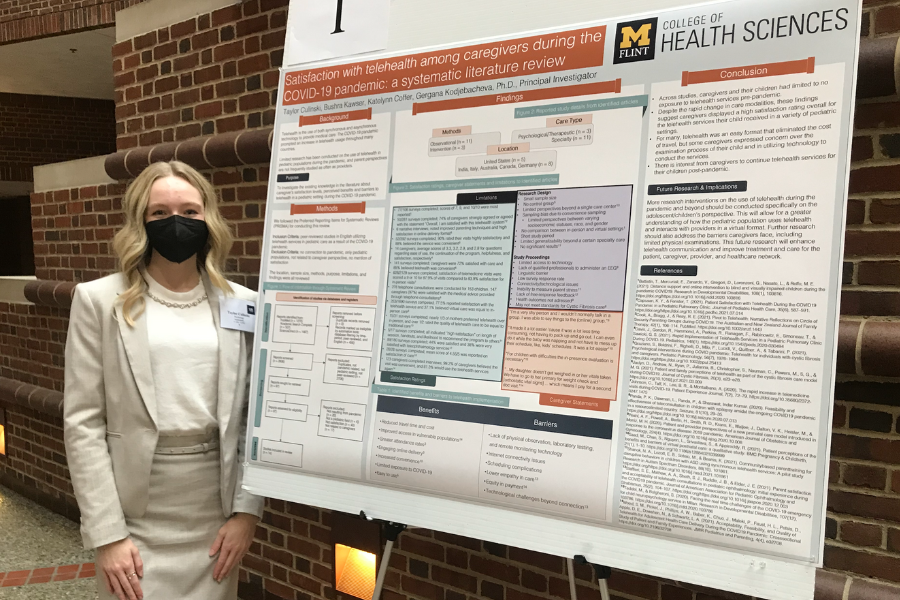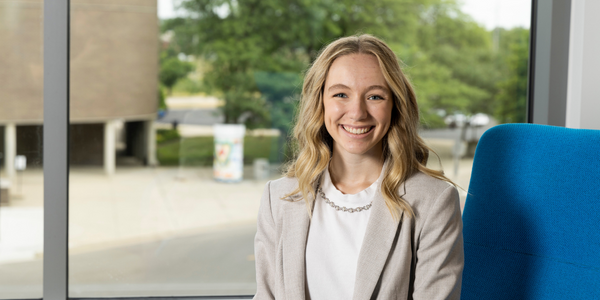Most students use their first year in college to take care of the basics, like exploring student clubs or learning how to find their way around campus. For Taylor Culinski, a junior psychology major from Swartz Creek, Michigan, her first year was the perfect time to begin conducting research alongside her professors. And it was that early venture into student/faculty partnerships that have played a major role in Culinski’s college career. She is now a mentor within the Undergraduate Research Opportunities Program (UROP) and is currently diving deeper into her research as a Summer Undergraduate Research Experience (SURE) fellow.
Culinski checked out the Infoready site early in her college career when she heard about it in one of her freshman classes. She found her first opportunity to conduct research at the University of Michigan-Flint with Gergana Kodjebacheva, associate professor of public health, interviewing primary caregivers in the community on telehealth use during the COVID-19 pandemic for their perceptions of its impact on their access to pediatric health care.
“I stumbled upon this research with Dr. Kodjebacheva my freshman year and it was totally not what I was expecting, but it turned out to be such a great learning experience,” Culinski said. “I’ve learned so many tools and fundamentals on how to do research.”
“In the process,” Culinski explains, “we interviewed a lot of parents and many of them struggled with how to use telehealth. They felt their provider didn’t offer telehealth resources as much as they would have liked.” She also observed that a variety of different telehealth resources are available for parents, but not the necessary guidance on how to use them.
This experience caused Culinski to think deeply about the ways research on campus can impact the community. She and Kodjebacheva observed that the pandemic exposed many parents to telehealth for the first time and improved access to care in vulnerable populations. “For Flint, especially with the water crisis, improving children’s health is something that should be at the forefront,” she says.
Some of the respondents pointed out that telehealth reduced travel time and cost. Other participants indicated that telehealth simplified their access to care. One said, “I c[ould] even do it while the baby was napping and not have to mess up their schedule…it was a lot easier.” It also mitigated their exposure to COVID-19 during the pandemic.
The researchers also observed some negative perceptions of the shift to telehealth as well. Some respondents cited a limited ability for doctors to physically evaluate patients or run laboratory tests. Some caregivers struggled with technological challenges, like internet connectivity and scheduling complications. They also observed that some perceived inequity in payment for health care from the shift to telehealth.
They suggested conducting the study again focusing on the children’s, rather than the caregiver’s perceptions. They also suggested research that specifically addresses the barriers caregivers face with telehealth. “This future research,” the report reads, “will enhance telehealth communication and improve treatment and care for the patient, caregiver, provider, and healthcare network.”

Culinski joined Kodjebacheva in a second study that developed and tested an intervention addressing telehealth barriers. Intervention research allows investigators to learn what strategies are most effective at improving outcomes for a given population. As part of her SURE fellowship, she developed an educational module on Canvas to teach caregivers how to use telehealth, and then they assessed its impact on perceived barriers. “I really hope, with this intervention study, that we can see what the parents in the community need to help support them in using telehealth, and how to make those resources accessible to people,” she said.
Culinski gained experience with the Internal Review Board (IRB) protocols, which ensure human subjects are treated ethically when involved with research projects. She worked with Kodjebacheva to properly design the experiment and even got to see the application process. Culinski says, “The control group participants actually get a delayed intervention, so they will still receive all of the information from the intervention about two weeks after the rest of the participants do.”
She is also assisting Kodjebacheva and Jillian Woodworth, clinical assistant professor of occupational therapy, in a project conducting focus groups with UM-Flint’s Occupational Therapy students about Telehealth, helping them to consider the use, benefits, and drawbacks in their profession.
Culinski is gaining valuable research skills with these internships, which she plans to direct toward her primary research interest in the future.
Her passion for research first bloomed when she wrote a research paper in her senior English class looking into the psychological and developmental effects of prenatal opiate exposure. “That was a defining moment for me, realizing how much I really did enjoy reading scientific articles and trying to understand all the information in them,” she said.
She is very excited about applying her UROP and SURE research experience to a new project related to the topics of prenatal opiate exposure and kinship caregiving with the student-led Diversity Equity and Inclusion and Urban Institute for Racial Economic and Environmental Justice initiatives. “I’m hoping if I do get accepted for the DEI/UIREEJ position that I would be able to use that to fuel my thesis and research projects that I’d really like to do in the future.”
“A big takeaway for me was that research takes time. It’s not something that you can do with a click of a button. There’s a lot more that goes into it. When you read a research article, you see the outline, the intro, the methods, the results, and the conclusion. It looks nice and simple; it’s all consolidated into 10 pages. But now on this side, I realize those 10 pages represent almost a year’s worth of work. For me, it has been huge to see how each small step that I make towards that research is helping me make progress along the way. It doesn’t need to be one big daunting, scary task.”
Taylor Culinski
In addition to fantastic faculty support, Culinski relays countless ways she and her classmates support one another. On the Telehealth project, she has been working alongside Graduate Studies Research Assistants Bushra Kawser and Mark Pyland. “We all work really well as a team and it’s been such a great experience,” she explains. ”I’ve had the opportunity to help them in different ways and they’ve helped me.” Also involved with the project are Katelynn Coffer, a dual Bachelor of Science/Master of Public Health student, and Marissa Speckmann, a dual-enrolled student going into her Junior year of high school. As a UROP mentor and project lead, Culinski is getting the chance to be a part of the ways she herself has been supported.
That support extends to Culinski’s role as president of the Psychology Club. Her own university journey has centered around the ways she wants to make a difference in the world. Considering this, she has helped institute a psychology careers section of their meetings to explore a variety of impactful ways to use a Psychology degree. They regularly talk about research in different areas of the field and incorporate community service as well. Last year, the group packaged 11,000 pounds of food at the Food Bank of Eastern Michigan.
For Culinski, these roles and activities are all part of her desire to make a difference. She is constantly working towards her goals and learning how to build a world that gives children the hope that they need to thrive.
A portion of this article appeared on NOW News & Happenings on August 10, 2022.
